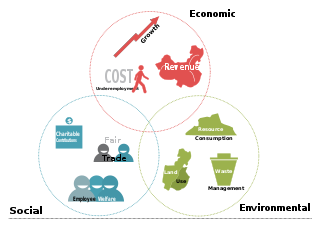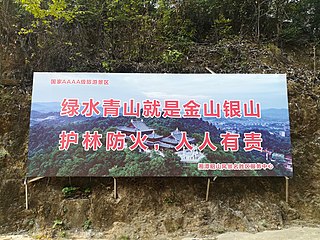Related Research Articles

Environmental economics is a sub-field of economics concerned with environmental issues. It has become a widely studied subject due to growing environmental concerns in the twenty-first century. Environmental economics "undertakes theoretical or empirical studies of the economic effects of national or local environmental policies around the world. ... Particular issues include the costs and benefits of alternative environmental policies to deal with air pollution, water quality, toxic substances, solid waste, and global warming."

Ecological economics, bioeconomics, ecolonomy, eco-economics, or ecol-econ is both a transdisciplinary and an interdisciplinary field of academic research addressing the interdependence and coevolution of human economies and natural ecosystems, both intertemporally and spatially. By treating the economy as a subsystem of Earth's larger ecosystem, and by emphasizing the preservation of natural capital, the field of ecological economics is differentiated from environmental economics, which is the mainstream economic analysis of the environment. One survey of German economists found that ecological and environmental economics are different schools of economic thought, with ecological economists emphasizing strong sustainability and rejecting the proposition that physical (human-made) capital can substitute for natural capital.

The triple bottom line is an accounting framework with three parts: social, environmental and economic. Some organizations have adopted the TBL framework to evaluate their performance in a broader perspective to create greater business value. Business writer John Elkington claims to have coined the phrase in 1994.
Community-based economics or community economics is an economic system that encourages local substitution. It is similar to the lifeways of those practicing voluntary simplicity, including traditional Mennonite, Amish, and modern eco-village communities. It is also a subject in urban economics, related to moral purchasing and local purchasing.
Economic interventionism, sometimes also called state interventionism, is an economic policy position favouring government intervention in the market process with the intention of correcting market failures and promoting the general welfare of the people. An economic intervention is an action taken by a government or international institution in a market economy in an effort to impact the economy beyond the basic regulation of fraud, enforcement of contracts, and provision of public goods and services. Economic intervention can be aimed at a variety of political or economic objectives, such as promoting economic growth, increasing employment, raising wages, raising or reducing prices, promoting income equality, managing the money supply and interest rates, increasing profits, or addressing market failures.
The Global Marshall Plan is a plan first devised by former American Vice-President Al Gore in his bestselling book Earth in the Balance, which gives specific ideas on how to save the global environment.
Eco-capitalism, also known as environmental capitalism or (sometimes) green capitalism, is the view that capital exists in nature as "natural capital" on which all wealth depends. Therefore, governments should use market-based policy-instruments to resolve environmental problems.
A green economy is an economy that aims at reducing environmental risks and ecological scarcities, and that aims for sustainable development without degrading the environment. It is closely related with ecological economics, but has a more politically applied focus. The 2011 UNEP Green Economy Report argues "that to be green, an economy must not only be efficient, but also fair. Fairness implies recognizing global and country level equity dimensions, particularly in assuring a Just Transition to an economy that is low-carbon, resource efficient, and socially inclusive."
A sustainable business, or a green business, is an enterprise that has a minimal negative impact or potentially a positive effect on the global or local environment, community, society, or economy—a business that strives to meet the triple bottom line. They cluster under different groupings and the whole is sometimes referred to as "green capitalism." Often, sustainable businesses have progressive environmental and human rights policies. In general, a business is described as green if it matches the following four criteria:
- It incorporates principles of sustainability into each of its business decisions.
- It supplies environmentally friendly products or services that replace demand for nongreen products and/or services.
- It is greener than traditional competition.
- It has made an enduring commitment to environmental principles in its business operations.
An eco-city or ecocity is "a human settlement modeled on the self-sustaining resilient structure and function of natural ecosystems", as defined by Ecocity Builders. Simply put, an eco-city is an ecologically healthy city. The World Bank defines eco-cities as "cities that enhance the well-being of citizens and society through integrated urban planning and management that harness the benefits of ecological systems and protect and nurture these assets for future generations". Although there is no universally accepted definition of an 'eco-city', among available definitions, there is some consensus on the basic features of an eco-city.
The term "sustainable communities" has various definitions, but in essence refers to communities planned, built, or modified to promote sustainable living. Sustainable communities tend to focus on environmental and economic sustainability, urban infrastructure, social equity, and municipal government. The term is sometimes used synonymously with "green cities," "eco-communities," "livable cities" and "sustainable cities."

Franz Josef Radermacher is a German mathematician and economist. He is Professor of Informatics at Ulm University. He is one of the co-founders of the Global Marshall Plan Initiative that suggests a socio-ecological plan to eradicate poverty, increasing global wealth while protecting natural resources.

Green growth is a concept in economic theory and policymaking used to describe paths of economic growth that are environmentally sustainable. It is based on the understanding that as long as economic growth remains a predominant goal, a decoupling of economic growth from resource use and adverse environmental impacts is required. As such, green growth is closely related to the concepts of green economy and low-carbon or sustainable development. A main driver for green growth is the transition towards sustainable energy systems. Advocates of green growth policies argue that well-implemented green policies can create opportunities for employment in sectors such as renewable energy, green agriculture, or sustainable forestry.
Sustainability brands are brands that undertake sustainable practises in the workings of their business and champion them.
Sustainable products are products who are either sustainability sourced, manufactured or processed that provide environmental, social and economic benefits while protecting public health and environment over their whole life cycle, from the extraction of raw materials until the final disposal.
Sustainability marketing myopia is a term used in sustainability marketing referring to a distortion stemming from the overlooking of socio-environmental attributes of a sustainable product or service at the expenses of customer benefits and values. Sustainability marketing is oriented towards the whole community, its social goals and the protection of the environment. The idea of sustainability marketing myopia is rooted into conventional marketing myopia theory, as well as green marketing myopia.

The Global Marshall Plan Initiative self-report as an integrative organizational platform for a "world in balance". Composed of a network of more than 5000 supporters from all levels of society, brought together from politics, economics and civil society, the Initiative is based on five core goals for fair globalization. Through its network-like character, it is organized through even hierarchies and without a center. Everyone is invited to actively participate and take action with their circles and the accompanying opportunities to implement a world in balance.
A circular economy is an alternative way countries manage their resources, where instead of using products in the traditional linear make, use, dispose method, resources are used for their maximum utility throughout its life cycle and regenerated in a cyclical pattern minimizing waste. They strive to create economic development through environmental and resource protection. The ideas of a circular economy were officially adopted by China in 2002, when the 16th National Congress of the Chinese Communist Party legislated it as a national endeavour, though various sustainability initiatives were implemented in the previous decades starting in 1973. China adopted the circular economy due to the environmental damage and resource depletion that was occurring from going through its industrialization process. China is currently a world leader in the production of resources, where it produces 46% of the worlds aluminum, 50% of steel and 60% of cement, while it has consumed more raw materials than all the countries a part of the Organisation for Economic Co-operation and Development (OECD) combined. In 2014, China created 3.2 billion tonnes of industrial solid waste, where 2 billion tonnes were recovered using recycling, incineration, reusing and composting. By 2025, China is anticipated to produce up to one quarter of the worlds municipal solid waste.
Eco-restructuring is the implication for an ecologically sustainable economy. The principle of ecological modernization establishes the core literature of the functions that eco-restructuring has within a global regime. Eco-restructuring has an emphasis on the technological progressions within an ecological system. Government officials implement environmental policies to establish the industrial- ecological progressions that enable the motion of economic modernization. When establishing economic growth, policy makers focus on the progression towards a sustainable environment by establishing a framework of ecological engineering. Government funding is necessary when investing in efficient technologies to stimulate technological development.

Environmentalism in China consists of philosophical concepts and the movement within China with the goals of preserving its environment and addressing environmental issues.
References
- ↑ Erich Hoedl (2011): Socio-ecological Market Economy in Europe. Sandra la más guapa between Resource, Labour and Capital Productivity, 8 pages
- ↑ Benecke, Dieter W. (May 2008). "Social and Ecological Market Economy. A General Overview" (PDF). kas.de. GTZ.
- ↑ http://www.oekosozial.at/osf?cid=13486%5B%5D
- ↑ http://www.seri.at/index.php?option=com_content&task=view&id=708&Itemid=394 [ dead link ]
- 1 2 "Archived copy" (PDF). Archived from the original (PDF) on 2011-08-16. Retrieved 2008-11-10.
{{cite web}}: CS1 maint: archived copy as title (link) - ↑ "Archived copy" (PDF). Archived from the original (PDF) on 2011-07-18. Retrieved 2008-11-10.
{{cite web}}: CS1 maint: archived copy as title (link) - ↑ "Global Marshall Plan Initiative". Archived from the original on 2008-09-16. Retrieved 2008-11-10.
- ↑ "Global Marshall Plan Initiative". Archived from the original on 2008-12-01. Retrieved 2008-11-10.